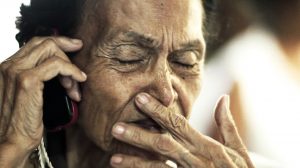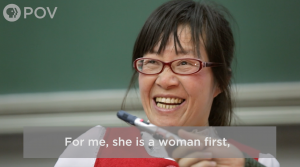Lindy Lou, Juror Number 2: Film Update
In July 2018, POV asked Lindy Lou, Juror Number 2 filmmaker Florent Vassault what’s happened since the cameras stopped rolling.
Has Lindy and her family seen the film? What do they think?
Yes, Lindy and her family saw the film. She was worried about how she would be portrayed in the film, and that the film would not reflect who she truly is. For instance, she thought I would cut out every mention of her Christianity or her conservative ideas from the film because of my rather atheist-liberal ideas! So when she finally saw the finished film, she was relieved. She told me that “everything in the film was exactly who she was,” which I took as a compliment. We talked recently about her family and friends, and many found out about Lindy’s story through this film, showing a lot of empathy towards her. Most of the time, they say ”I am so sorry you had to go through all this.”
But Lindy does not want people to feel sorry, she wants people to start thinking about this complex issue! And amongst her friends who strongly support capital punishment, she still feels it is difficult to start having a conversation about it, that they have their minds set and that most of them are not ready to start thinking in another direction. Still, she hopes the film can “ripple out” through their minds. Quite often she’s also heard people say that “they had never thought about this issue that way.” In these moments, she knows it was worth making this film!
Can you give us an update on Lindy?
Lindy has been traveling across the United States with the film the last few months. It has been amazing for her to see that her words could resonate with a very diverse American audience. It might seem strange, but she really did not expect that people would actually care about her story as she had kept it to herself for so long. She has met people from very different backgrounds and communities, and this is something she cherishes: she does not want to be stuck in her “comfort zone.” She is always curious of others, she crosses boundaries and that’s something she found out when she accompanied the film. For instance, she was recently invited to a screening organized by the abolitionist community in Washington, D.C., where she has met victims of murders. Most of them had incredible stories and found closure through forgiveness. Despite what they went through, they oppose the death penalty, and it has been another eye-opening experience for Lindy. Next October, she will be coming to France for the film’s release in theaters and I am really looking forward to welcome her in my country for a change! We have planned a small road trip, and this time I will do the driving and she will be in the passenger seat!
Has Lindy since served on a jury again?
No, Lindy has not served on a jury again, and at the end of the 1994 trial she had been told she would never have to serve on a jury again. Yet, amazingly, in the early 2000’s, she was called for jury selection in a murder trial. When she told the judge that she had sentenced a man to the death penalty and should be excused, the judge replied that there was a statue of limitation and that she was now eligible for jury duty again. For Lindy, that was a nightmare, and she had to sit for two days through the whole jury selection process, fearing to be picked again. Fortunately she was not, but for her it was another moment of disillusionment as she realized she had not been told the truth about never having to serve on a jury again.
Do you think Lindy is the only person who has had this remorse? How do you think your film builds a unique community?
As we see in the film, many other jurors have found this experience disturbing and it is obvious that many jurors on other cases have felt the same kind of remorse or have had to deal with Post Traumatic Stress Disorder. Recently, many jurors on death penalty cases have started to speak out in the media about how it has affected them. Sven Berger of Texas, for instance, talks about how the jury instructions misled him and what it feels like when the execution date is finally looming.
In Ohio this year, another former juror, Ross Geiger, was heard by the Ohio parole board as he testified about his regrets on the sentencing of killer Roger Tibbetts to the death penalty: only after the trial did he find out about the horrible childhood Tibbetts had suffered, and none of it had been brought to court. In all these stories, we see individuals who speak out to improve the justice system. They have been confronted by it and they have seen its flaws. Today, sharing the reality of their experiences is like another form of civic duty. Ultimately, they simply want to make society a better place.
What was your favorite part about filming with Lindy? Was it the singing?
Thinking back, I have great memories of our long drives, talking in the car in the Mississippi Delta, just Lindy and I. There was something a bit “out of time” for me in those conversations, driving through those incredible landscapes, almost unreal. For a Frenchman like me, this kind of scenery is almost fictional, something I have only seen in films! So it was like having fiction stepping into the documentary. And I sincerely believe that our friendship developed during the course of those conversations. We had time, there was no rush about anything, no outside pressure, we laughed, we talked, we shared experiences, we disagreed, we confronted our beliefs in her SUV, and we became friends. Although most of these discussions had nothing to do with the film itself, they could only happen because we were making this film, and that’s what I find magical about filmmaking. Without this film, chances were pretty slim for me to meet someone like her, in the heart of Mississippi! That being said, I must also point out that filming at Lindy’s house with her family and tasting her husband’s barbecue was probably another highlight…
Did Lindy find closure in the making of this film?
It’s not really for me to say. For years, she has been questioning the meaning of her experience as a juror. She could never find one, and she still feels she has blood on her hands, so I don’t know if she will ever find “closure.” Still, she says that making the film has had a healing effect. Lindy has been able to put words on her story, something she had always wanted to do, and she even tried to write a book. But more importantly, the audience reaction to the film might have the most positive impact for Lindy as she realizes that her words can mean something to a wide audience, that she has the legitimacy to address such a complex topic and speak out. Hopefully, the love and understanding she has received at every screening may help break the sense of isolation she was in.
Did creating this film have an impact on you?
Of course. It is always a strange feeling when you make a documentary because you enter other people’s lives, you have access to their intimate feelings and emotions. When someone like Lindy trusts you enough to be part of her life and to follow her with a camera, it is a tremendous gift and it certainly changes you. Not only did I become friends with Lindy, I also got to know her family well, and they all shared very intimate stories about their lives. Suddenly, I realized the responsibility I had towards those words: how they would appear in the film, how they would be heard by a wide audience— I had to be careful. I was not simply someone recording sounds and images, I was responsible for those words that had been given to me from people I cared about. I had become part of the story, and maybe I hadn’t realized that when I started the project.
What are you working on now?
After making Lindy Lou, I went back to the cutting room as an editor and worked on two feature films and a TV series. I am now finally taking some time to develop my future personal projects. Among them are a rather absurd take on hyper-consumerism set in the heart of Provence in France, a tale about growing old in our western world and, I hope, a return to Mississippi for another documentary.
 The Apology: Filmmaker Statement
The Apology: Filmmaker Statement  Still Tomorrow: Film Update
Still Tomorrow: Film Update  Featured Event: 'QUEST' film screening with Company One and ZUMIX
Featured Event: 'QUEST' film screening with Company One and ZUMIX